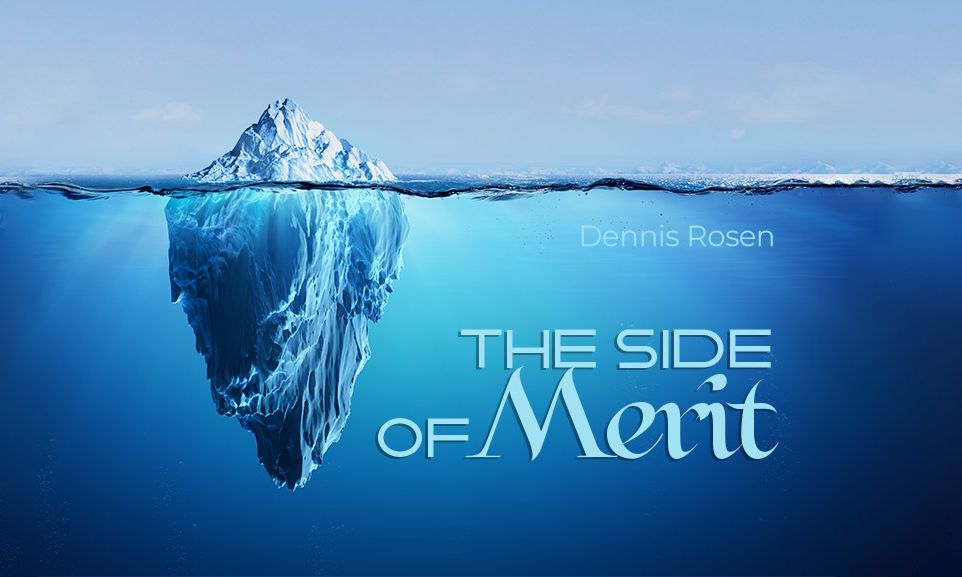
The Side of Merit
One of our biggest hurdles in navigating human relationships is the area of communication. How can we master the single, most important key to success in this area?

During this time of the year when we count the Omer, it’s especially important to strengthen ourselves in the mitzvot between man and fellow man. In order to avoid the terrible transgression of evil speech, we need to uproot it at its source. Evil speech originates in our failure to judge other people favorably.
Just the facts, please
Rabbi Lazer Brody writes in the book Trail to Tranquility that most life situations resemble icebergs. Less than 10% is visible to the casual viewer and another 90% is below the surface hidden from the eyes. We need to avoid judging another person unless we’re sure we have all the facts. Chances are that anger directed at another human being is based on an utter lack of information.
I remember when I was in graduate school that there was one classmate who scowled at me all the time. I got the impression that he was a mean-spirited arrogant person and I disliked him intensely. I later found out that he wasn’t scowling at all. He was legally blind and he was actually squinting, desperately trying to see as much as he could. I felt so ashamed when I realized I had judged him harshly and unfairly.
Look inside yourself first
 When another person gives us a difficult time, we have to contemplate that we don’t know the reason for the other person’s bad behavior. We don’t know all the negative circumstances in his life and what makes him tick. It’s best to forgive and concentrate on improving ourselves.
When another person gives us a difficult time, we have to contemplate that we don’t know the reason for the other person’s bad behavior. We don’t know all the negative circumstances in his life and what makes him tick. It’s best to forgive and concentrate on improving ourselves.
A friend of mine once had a boss who was giving him a very difficult time. He was abusive and disrespectful and the situation was becoming very distressful. My friend contacted a prominent and very wise Rabbi and asked if it was okay for him to hate this person. The rabbi answered: “Not only are you not allowed to hate him but you should pray for him. If you were him you’d be worse!”
Don’t Hate the Messenger
We need to recognize that when anyone else causes us pain that person is merely a messenger from Hashem. No one can help or harm us without His command. Rather than becoming angry and speaking ill about the other person, we should look to Hashem to try to determine what message He is transmitting and how we need to improve. Moreover, we need to recognize that Hashem wants us to forgive the other person and not harbor a grudge. This is very difficult but the potential rewards are tremendous.
In an emuna shiur from Rabbi David Ashear, he recounts a story heard from Rabbi Elimelech Biderman about a poor chatan (groom) from Israel who came to America to collect money for his wedding. He knocked on one door and the owner of the house came out and started yelling at him. During the hurling of insults and humiliation, the boy just stood there, calm and cool, without flinching.
At the end of the tirade, the homeowner took out $300 and handed it to the boy. The chatan thanked him and was about to leave. Then, the man asked him, “How were you able to just stand there like that, taking in all of my insults without responding?” The chatan took out a little notebook, containing the names of the people from whom he was going to collect. There was a short comment next to each name. The chatan told him, “By your name, it says that he yells and insults, but afterwards he gives $300. So I was fine with the insults, because I knew I would get my money afterwards.”
Rabbi Ashear writes that if we could appreciate what being offended does for us, we would accept it much better. It paves the way for blessing and wipes away thousands of sins.
Rabbi Brody writes that the peacemaker forgives, forgets, and doesn’t feel pain in his heart when he encounters someone who hurt him in any way. Why? The peacemaker of tranquility knows that everything comes from Hashem. If Hashem sends him pain or insult he knows that it’s for his benefit.
Rebbe Nachman says that a person must seek peace with his fellow human, and with himself. Inner peace means that one doesn’t differentiate between favorable occurrences and unfavorable occurrences, and happily sees the hand of God in whatever happens.
Let’s Remember:
* Never look down on anyone unless you’re helping him up.
* When we look for the best in others we bring out the best in ourselves.
* Life is like an iceberg. In most situations important facts are hidden from view.
* We should focus on improving ourselves and forgive others when they cause us pain.
* Everything that happens to us, even mistreatment by another person is from Hashem and for our well-being.
In the merit of judging others favorably, we will certainly refrain from Evil speech. Our speech will be pure and therefore, our prayers will be favorably accepted. Hashem will surely respond with major blessings and salvations, Amen.







Tell us what you think!
Thank you for your comment!
It will be published after approval by the Editor.